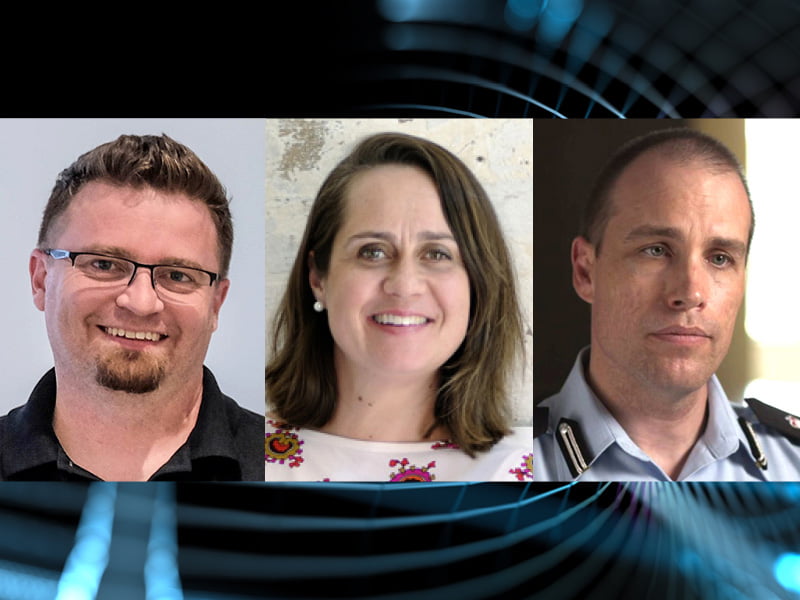The Australian Federal Police has made cybercrime a central priority for 2020 and beyond, ratcheting up cybercrime operations as the force confronts COVID-themed cyberattacks, as well as an increase in the volume and belligerence of cyberattacks by state-based actors.
AFP Commander of Cybercrime Operations Chris Goldsmid outlines the expansion of the AFP’s operational approach to cybercrime in the latest episode of the Verizon Age of Trust podcast series.
In the episode “Securing the Heartbeat of Knowledge”, InnovationAus publisher Corrie McLeod talks to Commander Goldsmid and Verizon Network Security Operations Director Prescott Pym about developments in the Australian cyber threat environment.
The strengthening of the AFP’s cybercrime response comes as Australia grapples with COVID-19 related cyber problems and state actors ramping up cyber-attacks. Prime Minister Scott Morrison warned in June of sophisticated state-based actors attacking Australian organisations that government sources attributed to China.

That was followed by the federal government beefing up the nation’s cyber resilience by repurposing $1.35 billion of the Defence budget toward strengthening cybersecurity capabilities.
The government’s 2020 Cyber Security Strategy released in August included new laws to protect the nation’s critical infrastructure and new powers for police to target dark web activity.
At the same time, AFP Commissioner Reece Kershaw put a spotlight on the force’s anti-cybercrime operations, as outlined during a recent address to the National Press Club.
The AFP he said has primary responsibility for the investigation of cybercrimes directed at critical infrastructure, systems of national significance, Commonwealth Government networks and those impacting the whole of economy. The list of crime targets includes significant computer intrusions, hacktivism, ransomware and business email compromise.
The AFP operates cyber investigation teams in Sydney, Melbourne and Canberra including a complement of officers at the Australian Cyber Security Centre (ACSC). The AFP was one of four Australian organisations that contributed to Verizon’s latest Data Breach Investigation report.
“We’ve recognized and responded to the expanding cyber threat, establishing cybercrime as an area of focus in 2020 and beyond. Cybercrime is a standalone priority and is front of mind, both in terms resourcing and the activities we do,” Commander Goldsmid said.
That increased focus is already paying off. AFP officers last week arrested two men in Sydney for allegedly operating a sophisticated SMS phishing scam. Police seized SIM cards, mobile phones, laptops and hard drives, fake ID documents, $50,000 in cash and a money counter.
Enhancing social awareness of cyber security is also a major part of the AFP’s remit and the force is concentrating on leveraging the prevention and awareness campaigns that are run out of the ACSC both for industry and the general community. The strategy is simple, the more awareness and consciousness around cybercrime there is, the better Australians can protect themselves.
That increased awareness has become critical during the pandemic. “We have seen the criminals pivot to COVID-19 themed cybercrime,” says Commander Goldsmid in the podcast. “So that’s phishing campaigns and SMS scams with a COVID-19 theme.”
Cyber criminals are also disguising their attacks with COVID-19 related requests for information such as links to testing sites or government financial assistance packages.
Mr Pym notes a big increase in chatter on the dark web that is related to the pandemic. This intelligence was picked up in Verizon’s recent COVID-19 supplement to the firm’s annual Data Breach Investigations Report.
“There is a significant uptick in mentions of COVID and coronavirus amongst the criminal underground, particularly in the March to May timeframe.” says Mr Pym in the podcast.
The AFP sees business email compromise as one of the key threats facing Australia and building a good security culture within an organisation is crucial to resisting attacks. “Employees need to be alive to the fact that if they receive an email from the CEO, asking for transfers into iTunes accounts, that’s almost certainly not legitimate,” says Commander Goldsmid in the podcast.
The podcast participants discuss strategies for creating stronger links between government, the community and industry to forge national resilience to cybercrime. While government has a major role to play in bolstering the nation’s cybersecurity, that effort must be coupled to a collective responsibility across industry and the community.
“The 2020 cyber security strategy will be a step forward in how we build the interactions between industry, government and community and how we educate people about the threat and help them protect themselves online,” says Commander Goldsmid in the podcast.
The next episode in the Verizon Age of Trust podcast series features Nathan Strong, Verizon Client Partner, Defence & Security along with Michael Masterson, Managing Director, EverEdge Global discussing how to thrive in a post COVID-19 world.
Do you know more? Contact James Riley via Email.
